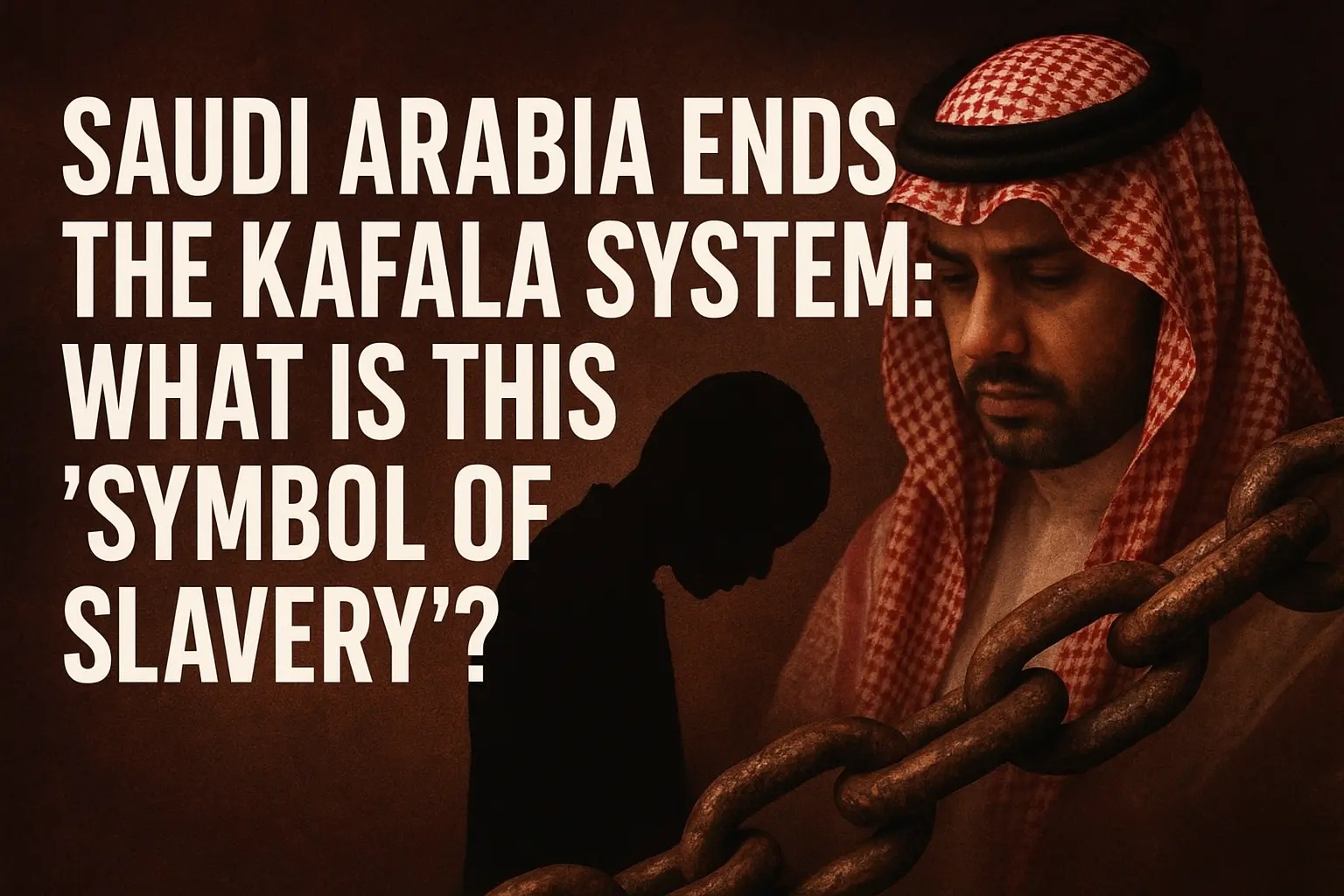Saudi Arabia Ends the Kafala System: What Is This ‘Symbol of Slavery’?
Saudi Arabia has recently announced the abolition of the Kafala system in the country. This was the system through which foreign workers could enter Saudi Arabia for employment. But the question remains: what exactly is the Kafala system?
What Is the Kafala System?
For decades, this system operated across the Gulf countries and was widely regarded worldwide as a ‘symbol of slavery.’ Under this law, a worker’s visa and passport were held by their employer, known as the Kafeel. This meant that workers could not change jobs, were restricted from leaving the country, and had very limited rights to fight against exploitation or abuse.
Meaning of Kafeel
To understand the Kafala system, it’s essential to know the meaning of Kafeel. Literally, Kafeel means guarantor or sponsor. The Arabic word “Kafeel” is also mentioned in the Quran, where it refers to a responsible, trustworthy, or protective person.
The root of the word Kafeel in Arabic is “Kaf–Fa–Lam,” which has three main meanings:
- To guarantee, take responsibility, or act as a witness
- To take charge or handle something
- To be trusted to care for something
From this concept of Kafeel, the Kafala system emerged — essentially a sponsorship system where the sponsor (Kafeel) assumes responsibility for the worker’s well-being and legal status.
The Kafala System Through the Decades
For nearly 50 years, the term Kafalahas been tied to the fate of millions of foreign workers in the Gulf. Under this system, workers were entirely dependent on their Kafeel, who decided whether they could change jobs, leave the country, or fight against mistreatment.
In the Gulf countries, this is known as the Kafala Sponsorship System. Around the 1950s, it was implemented across the Gulf Cooperation Council (GCC) countries — Bahrain, Kuwait, Oman, Qatar, Saudi Arabia, and the United Arab Emirates — and also in Jordan and Lebanon.
Why Gulf Countries Adopted the Kafala System
The question arises: why did Gulf countries feel the need for such a system?
Back in the 1950s, Gulf nations, suddenly wealthy from oil, were experiencing rapid development. Large-scale infrastructure projects were underway, but the local workforce was insufficient to meet demand. The population in these countries was relatively small. To fill this labor gap, it was decided to temporarily bring in foreign workers who could complete the required work and then return to their home countries.
Most of these foreign workers were unfamiliar with the local language, culture, or customs. They also had little knowledge of the local laws. Initially, the responsibility of sponsors—known as kafeels—was to ensure the safety and basic needs of these migrant workers. However, over time, rules changed, and the relationship between sponsors and workers became increasingly unbalanced. The system gradually turned exploitative, and many reports emerged of workers being effectively held “hostage” by their employers.
Exploitation UnderKafala
Under the Kafala system, foreign workers were entirely dependent on their employers, or kafeels. Their legal status was tied to the sponsor, who controlled their right to reside in the country, change jobs, or even leave the nation. Without the employer’s permission, workers could neither switch companies nor obtain exit visas.
Furthermore, workers facing mistreatment often had no legal recourse. While the system was originally intended to reduce bureaucracy in government offices and allow private sponsors to oversee and regulate labor, in practice it created a significant power imbalance. Employers could confiscate passports, withhold wages, or threaten deportation, leaving workers with almost no protection.
Who Were These Workers?
Initially, Gulf countries recruited labor from Egypt and neighboring Arab states. Over time, however, the focus shifted to non-Arab, particularly South Asian workers from India, Pakistan, Bangladesh, and Nepal, largely due to the availability of cheaper labor.
According to The Times of India, around 13.4 million expatriate workers reside in Saudi Arabia, making up roughly 42% of the population. Many of these workers come from South and Southeast Asia, including India, Bangladesh, and the Philippines. Reports by India Today, citing the International Labour Organization (ILO) and Human Rights Watch (HRW), estimate that approximately 24 million workers across the Gulf are still under the Kafala system, with the largest group—around 7.5 million—being Indian nationals.
Indians in the Gulf
As of December 9, 2022, data from India’s Ministry of External Affairs shows that the largest number of Indian workers in the Gulf reside in Saudi Arabia and the UAE. Specifically, 3.55 million Indians work in these countries, with 2.46 million in Saudi Arabia and 924,000 in Kuwait.
Why Saudi Arabia Abolished the Kafala System
The Kafala system in Gulf countries has long faced global criticism. Human rights organizations and the International Labour Organization (ILO) have labeled it a form of modern slavery. The system deprived workers of basic rights, leading to decades of condemnation. Countries where it was implemented have been under continuous international pressure to reform or abolish it.
In June 2025, Saudi Arabia officially decided to end the Kafala system. The move is said to be part of a broader plan spearheaded by Crown Prince Mohammed bin Salman.
The Crown Prince aims to expand Saudi Arabia’s economy and attract foreign investment from around the world. Additionally, the leadership seeks to rebrand the country as a modern, progressive nation. Global pressure also played a role, with numerous international rights groups, Western countries, and multinational corporations strongly criticizing Kafala-like regulations.
What Comes After Kafala: The New System
Saudi Arabia is replacing the Kafala system with a new contract-based employment system, designed to grant workers greater freedom and rights. Under this system:
- Workers will have the freedom to change jobs without needing their employer’s permission.
- They can exit the country without requiring consent from their sponsor.
- Procedures for labor court cases and filing complaints against mistreatment will be simplified.
The reform is expected to reduce worker exploitation and enhance Saudi Arabia’s global reputation, making the country more attractive to international investors.
Read Also: Luxury Interiors by Carmen: Crafting Timeless Elegance
















Leave a Reply